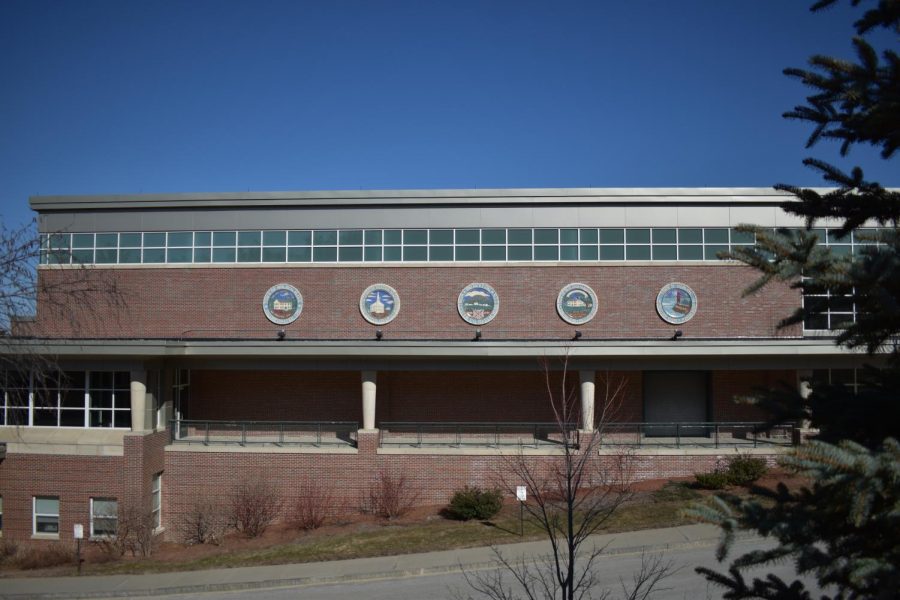COVID unmasks school committee flaws
These seals represent the five towns that school committee representatives are advocating for.
In a year so vastly different from any other, the Wachusett Regional School Committee has been put under a great deal of pressure to deliver answers and lead the district.
They have failed.
After watching hours upon hours of school committee meetings, the disconnect between the superintendent and members has become painfully evident.
The committee has, despite its best intentions, failed to adequately monitor and evaluate the work of the superintendent. Members, themselves, feel uninformed about basic details of how the district has handled the ongoing pandemic and the fluctuations in learning models connected to it.
An example of this lies in the hiring of the educational consultant.
The committee, in a special meeting in September, gave authority to superintendent McCall to hire an educational consultant and provided a specific list of duties and responsibilities, including consistent reporting of the consultant’s actions to create transparency, that they wanted the hired person to accomplish.
In late October Dr. McCall hired Dr. Mary Meade-Montaque, a former Manager for Instruction and School Leadership for Worcester Public Schools.
But following the hiring, the committee backed off on nearly all of the provisions of the motion and let the superintendent dictate the consultant’s duties with little oversight from the committee.
When school committee members asked for the specific details of the consultant’s work, they were rebuffed or ignored outright.
“I asked the superintendent what kinds of discussions [involving the consultant] with what different groups are happening in terms of implementing [the hybrid plan],” said Holden school committee member Maleah Gustafson. “I have reiterated them [the requests] in multiple emails, but I have not heard any specific response to those requests.”
Gustafson also added that her requests did not appear in the superintendent’s report to the school committee.
Multiple members of the committee also attempted to start discussions around issues with the superintendent’s conduct on multiple occasions throughout the year, culminating in a motion to form a task force to handle the situation.
These issues included the many grievances listed by the district’s teachers in a lengthy statement of no confidence released in December, as well as the superintendent possibly misrepresenting the opinions of the towns’ Boards of Health in an attempt to ease the committee’s mind about starting hybrid learning.
“For me it was about us wanting to get accurate information about what’s going on in the district. In the same vein of things that things were mentioned by the WREA as well as things that, as a committee, we’ve been asking for on multiple occasions, trying to improve the transparency with how we operate,” said Paxton member Karl Ottmar, who spoke in favor of the motion. “This was one specific example where the information I had received from a representative of the Boards of Health didn’t match up with what we told at the meeting and so I wanted to bring that forward as an example of information being held back.”
The motion failed and conversation around these problems has stalled.
The inability of members to affect change points to a structural problem – the size of the committee.
The WRSDC consists of a chair, vice chair, and twenty other members in a system designed to mirror the number of students in each town of the district. Meanwhile, districts such as Algonquin Regional, Nashoba Regional, and Quabbin Regional have school committees that range from ten to fifteen members.
The massive size of the WRSDC makes it extremely difficult for the committee to enforce anything on a unified basis. Meetings often consist of a barrage of different agendas with members fighting to make points that dilute the strength of the final motions presented.
A smaller committee, possibly featuring one or two members per town and two or three from Holden, would be able to operate more efficiently. Each member would be able to handle the requests from their constituents in a more effective manner instead of being drowned out by the sheer number of other voices in the room.
But state law makes a smaller organization impossible without major changes to the way the committee operates.
“Even if the towns voted for it [a smaller committee that doesn’t directly reflect population], it would never pass muster at the state level,” said Holden school committee member Kenneth Mills and chair of the Ad-hoc Subcommittee for the Regional Agreement that has begun discussing changing the size of the committee. “In order for there to be a smaller committee, Paxton and Princeton would have to only have one member, or there would have to be weighted voting or district wide representation.”
Weighted voting would mean that committee members from larger towns would have their votes count more than members from smaller towns, while district-wide representation would create a system where committee members would be elected by voters from the entire district, as opposed to just from their hometowns.
Even without these significant changes to the school committee, elected representatives admit that improvements could be made.
“It is possible that changes could be made to make the committee run more efficiently, but it is going to be up to the committee and towns to decide what happens and what changes may be made.” said Mills.
The pressure to improve as a governing body has also come from the community. Constituents have raised the expectations of the committee – making it THE public face of a year marred by false starts and contradictions, many of which are no fault of the members themselves.
This year has also put a massive strain on the personal lives of the school committee members, leading to the resignation of more than one elected official, including committee chair Megan Weeks.
“It was a very challenging decision to step down after six years on the committee, a responsibility I have taken very seriously,” said Weeks. “Despite my commitment to WRSD, I needed to take time to dedicate to my family and to decrease stress as my doctor asked me to do.”
The pandemic has exposed many public institutions and demonstrated their ability – or inability – to handle difficult situations. The school commitee’s performance this year suggests that changes should be made in order for it to better serve the district.
Ultimately, in this dysfunctional atmosphere, students suffer the most as they feel the direct ramifications of the decisions they do – or do not – make. Students are tired of trying to navigate constantly changing plans and watching adults fail to communicate and work together.
All members of the Wachusett community deserve better.






